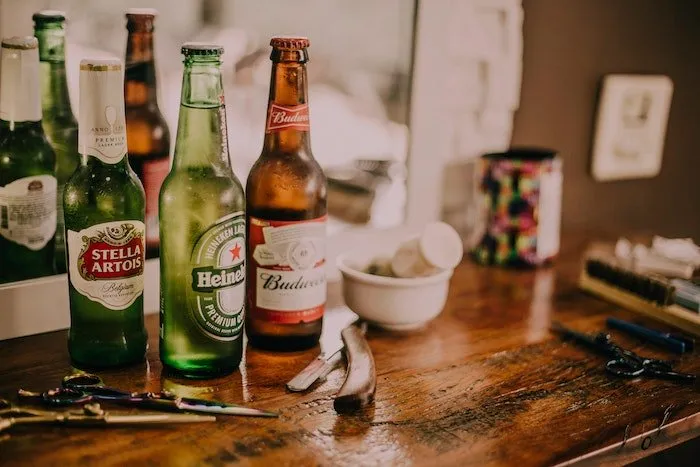It’s a question many beer lovers have asked themselves: how long does it take to drink a beer? The answer may vary depending on the type of beer, but there are certain factors that affect your drinking time. From the effects of alcohol on our bodies and minds, to responsible drinking practices for enjoying beers safely, we’ll explore all aspects related to this important topic.
In addition, we’ll also discuss some potential health benefits associated with moderate beer consumption. So sit back, relax and let’s dive into what makes up an enjoyable experience when sipping cold suds!
Table of Contents:
- How Long Does it Take to Drink a Beer?
- Types of Beer and Their Drinking Times
- Effects of Alcohol on the Body and Mind
- Health Benefits of Moderate Beer Consumption
- Responsible Drinking Practices for Enjoying Beer Safely
- FAQs in Relation to How Long Does It Take to Drink a Beer
- Conclusion
How Long Does it Take to Drink a Beer?

The amount of time it takes to drink a beer can vary depending on several factors. These include the type of beer, the size and shape of the glass, and even how cold or warm it is. Generally speaking, most beers take about 10 minutes to finish drinking.
When it comes to types of beer, lagers tend to be consumed faster than ales due to their lighter body and lower alcohol content. Stouts and porters usually take longer because they have higher alcohol content and are more robust in flavor. Ciders and meads also tend to take longer since they are sweeter than other beers. Other variations such as wheat beers may also require more time for consumption due to their unique flavors.
The size and shape of the glass can also affect how long it takes you to drink a beer. For example, larger glasses with wider mouths allow for quicker consumption while smaller glasses with narrower openings will slow down your rate of drinking significantly. Additionally, if you’re drinking from a bottle instead of a glass then that too could influence your speed at which you consume your beverage – bottles typically require more effort when sipping compared with glasses so this could add some extra seconds onto your total drinking time as well!
Finally, temperature plays an important role in determining how quickly you can enjoy your brewskis; colder drinks will often go down easier than warmer ones so if you’re looking for ways to speed up your imbibing process then make sure that whatever vessel or container you’re using is chilled beforehand!
Drinking beer is an enjoyable experience, but it’s important to be aware of how long it takes to drink a beer. This article will explore the various types of beers and their associated drinking times.
Types of Beer and Their Drinking Times
Lagers are a type of beer that is brewed with bottom-fermenting yeast. This process gives the beer its light, crisp flavor and makes it ideal for drinking in hot weather or during social gatherings. Lagers have a milder taste than ales and tend to be less bitter. Popular lager beers include Budweiser, Coors Light, Heineken, Corona Extra, and Pilsner Urquell.
Ales are another type of beer that is brewed with top-fermenting yeast. This process produces a more robust flavor than lagers and can range from sweet to bitter depending on the ingredients used in brewing. Ales also tend to have higher alcohol content than lagers due to their longer fermentation period. Popular ale beers include Guinness Stout, Sierra Nevada Pale Ale, New Belgium Fat Tire Amber Ale, Dogfish Head 60 Minute IPA, and Samuel Adams Boston Lager.
Stouts and porters are dark beers made with roasted barley or malt that give them their distinct color and flavor profile. Stouts typically have an intense coffee-like bitterness while porters tend to be sweeter with notes of chocolate or caramelized sugar flavors. Popular stouts include Guinness Draught Stout and Left Hand Milk Stout Nitro while popular porters include Founders Porter and Deschutes Black Butte Porter .
The type of beer you drink and the amount of time it takes to consume can have a major impact on how alcohol affects your body. Knowing the different types of beers, their drinking times, and their potential effects can help you make informed decisions when consuming alcoholic beverages. Let’s take a look at the effects of alcohol on the body and mind.
Effects of Alcohol on the Body and Mind

Alcohol consumption can have both physical and mental effects on the body. When consumed in moderation, alcohol can be a pleasant experience for some people; however, when abused or over-consumed it can lead to serious health issues.
Physical Effects of Alcohol Consumption
The short-term physical effects of drinking alcohol include impaired judgment, coordination, memory loss, nausea, dehydration and more. Long-term physical effects may include liver damage due to excessive alcohol consumption which can lead to cirrhosis (scarring) of the liver as well as an increased risk for certain cancers such as mouth cancer and breast cancer. Additionally, heavy drinking has been linked to heart disease and stroke.
Mental Effects of Alcohol Consumption
In addition to its physical effects on the body, alcohol also affects mental processes such as thinking skills and decision making abilities. Short term mental impairments from drinking too much may include confusion or difficulty concentrating while long term use may result in depression or anxiety disorders. Excessive drinking is also associated with an increased risk for developing dementia later in life.
Chronic alcoholism is known to increase one’s risk for suicide due to changes in brain chemistry that occur with long term use or abuse, as well as social isolation caused by addiction itself. This can lead many individuals down a path towards self destruction if not addressed properly through treatment options available today such as therapy or medication assisted treatment programs like Suboxone®.
Alcohol consumption can have a range of effects on the body and mind, both short-term and long-term. However, there are also health benefits associated with moderate beer consumption that should be taken into consideration when discussing the overall impact of alcohol.
Health Benefits of Moderate Beer Consumption
Beer has been around for centuries and is one of the most popular alcoholic beverages in the world. While it’s important to drink responsibly, there are some potential health benefits associated with moderate beer consumption.
- Nutritional Benefits of Beer: Beer contains a variety of vitamins and minerals that can be beneficial to your health. It is especially high in B6 and B12 vitamins which help support healthy brain function, energy production, and red blood cell formation. It also contains magnesium which helps maintain strong bones as well as potassium which helps regulate fluid balance in cells.
- Cardiovascular Benefits of Beer: Moderate beer consumption may have positive effects on cardiovascular health due to its antioxidant content such as flavonoids and phenols. These antioxidants can help reduce inflammation throughout the body while also lowering cholesterol levels by increasing HDL (good) cholesterol levels while decreasing LDL (bad) cholesterol levels. This could potentially lead to improved heart health over time when consumed moderately.
- Other Health Benefits of Moderate Beer Consumption: Studies have shown that moderate beer consumption may reduce risk for diabetes or stroke due to its anti-inflammatory properties as well as its ability to increase good cholesterol levels while decreasing bad ones. Additionally, research suggests that drinking beer regularly can improve bone density since it contains silicon which aids in calcium absorption into bones leading to stronger bones overall.
Responsible Drinking Practices for Enjoying Beer Safely
It is important to practice responsible drinking when consuming beer. Understanding your limits and setting limits beforehand are key components of safe drinking. Knowing how much you can handle before feeling the effects of alcohol will help you avoid overconsumption or intoxication. Before going out, set a limit for yourself on how many beers you plan to drink and stick to it.
Alternatives to drinking beer can also be helpful in avoiding overconsumption or intoxication. Instead of having another beer, try switching up drinks with a soda or water every few rounds. If someone else is driving, offer them an alternative non-alcoholic beverage as well so they don’t feel left out while still remaining sober enough to drive safely home afterwards.
If you find that your consumption has become excessive or if you think that there may be an issue with alcohol abuse or addiction, seek professional help immediately from a medical provider who specializes in treating substance use disorders such as alcoholism and addiction counseling services available at most health centers and hospitals nationwide.
In conclusion, practicing responsible drinking habits when enjoying beer is essential for staying safe while still having fun. Remembering these tips will ensure that everyone remains safe throughout the night: understanding your limits; setting limits beforehand; alternatives to drinking beer; and seeking help if needed for any issues related to alcohol abuse or addiction.
FAQs in Relation to How Long Does It Take to Drink a Beer
How long does it take to feel 1 beer?
Generally, most people will start to feel the effects within 10-20 minutes after consuming their first drink. Factors such as body weight, gender, and tolerance level can also affect how quickly you may begin to feel the effects of alcohol. Additionally, drinking on an empty stomach or mixing different types of drinks can increase the rate at which you become intoxicated. It is important to remember that everyone’s experience with alcohol is unique and there is no definitive answer for how long it takes to feel one beer.
How fast should I drink beer?
Drinking beer too quickly can lead to unpleasant side effects such as feeling bloated, dizzy, and even nauseous. Therefore, it is best to drink beer at a moderate pace. Start by taking small sips and savoring the flavor of each sip before moving on to the next one. Take breaks in between drinks if needed and stay hydrated with water or other non-alcoholic beverages. Enjoying your beer slowly will also help you appreciate its complexity more fully and make for a more enjoyable drinking experience overall.
How long should it take to drink one drink?
The amount of time it takes to drink one beer depends on the size and type of beer, as well as individual preference. Generally speaking, a 12-ounce bottle or can of regular strength beer should take about 10 minutes to consume. Stronger beers may take longer due to their higher alcohol content. Additionally, some people prefer to savor their drinks and will therefore spend more time drinking each beverage than others who are looking for a quick fix. Ultimately, the length of time it takes someone to drink one beer is up to them!
Will 1 beer an hour get you drunk?
No, drinking 1 beer an hour will not get you drunk. The amount of alcohol consumed and the rate at which it is consumed are both important factors in determining whether or not someone will become intoxicated. Generally speaking, one 12-ounce beer contains about 5% alcohol by volume (ABV). Consuming more than two beers per hour can lead to intoxication. It’s also important to note that individual tolerance levels vary greatly and should be taken into consideration when consuming alcoholic beverages.
Conclusion
In conclusion, the answer to how long it takes to drink a beer depends on many factors such as the type of beer, individual drinking habits and preferences, and health considerations. Beer can be enjoyed responsibly in moderation for its potential health benefits. It is important to remember that alcohol affects everyone differently and should always be consumed with caution. Whether you are enjoying an IPA or a stout, understanding how long does it take to drink a beer can help ensure that your experience is enjoyable and safe.
Are you looking to learn more about beer and how long it takes to drink one? If so, Brew Publik is the place for you! We provide reviews of different beers, equipment needed for home brewing, subscription services that deliver fresh brews right to your door, and tips on making your own delicious beer. So join us today in our mission of discovering new ways to enjoy a cold one – no matter what time or occasion calls for it. Cheers!

